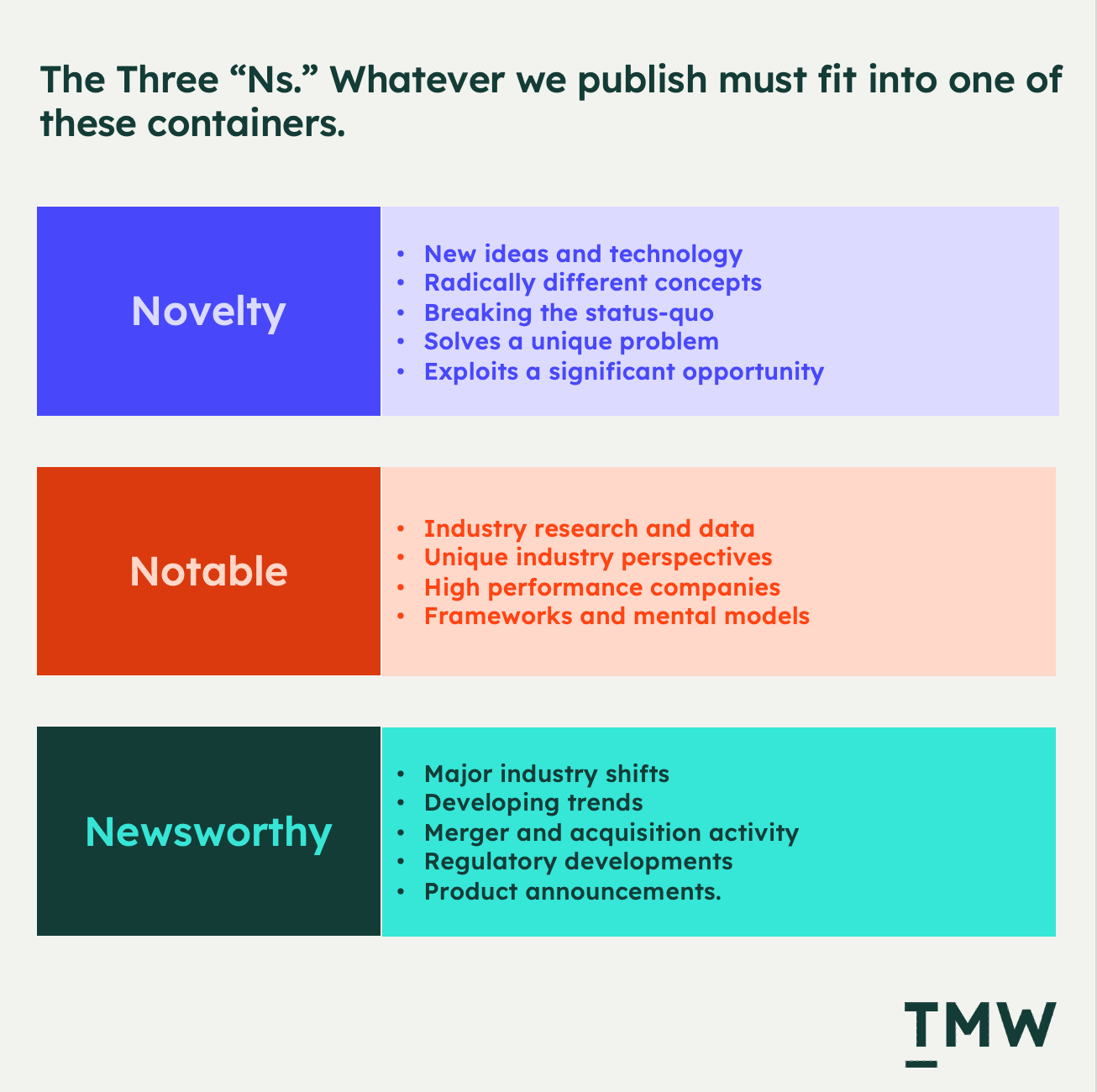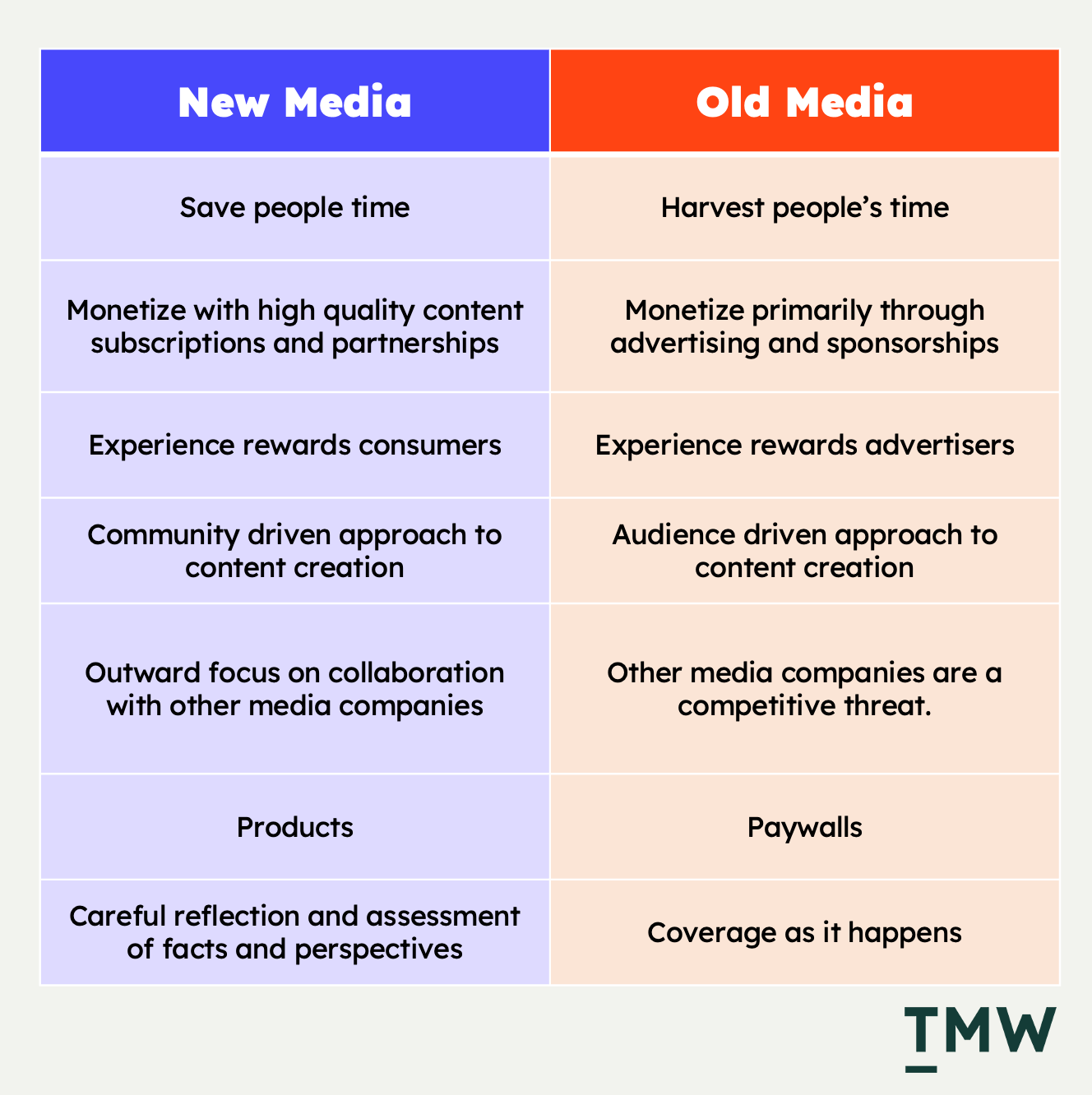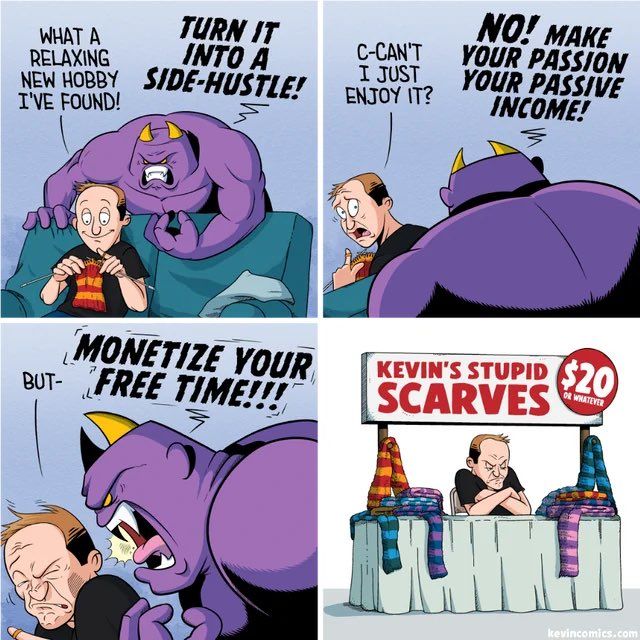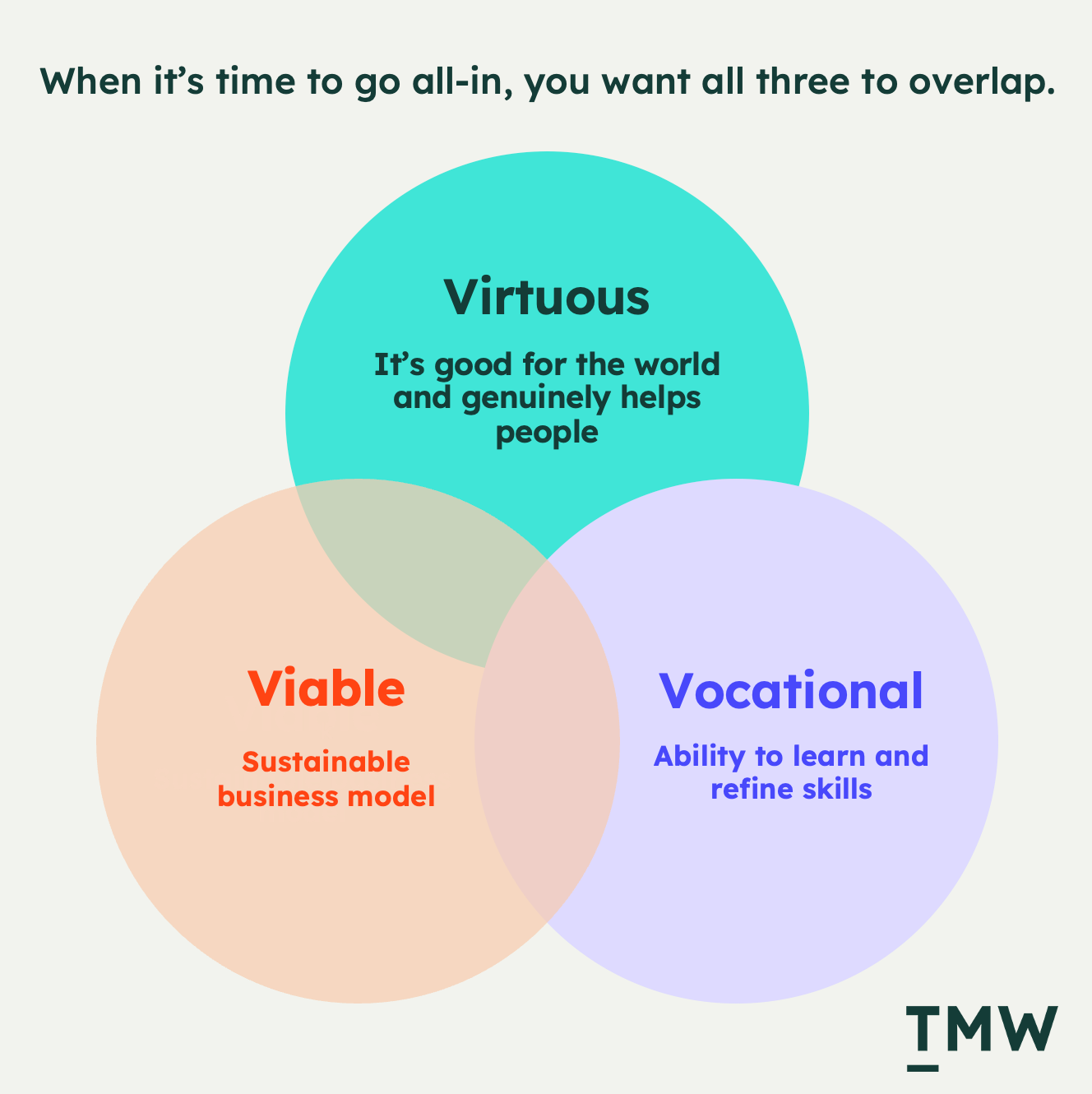TMW #116 | New Media
Welcome to The Martech Weekly, where every week I review some of the most interesting ideas, research, and latest news. I look to where the industry is going and what you should be paying attention to.
👋 Get TMW every Sunday
TMW is the fastest and easiest way to stay ahead of the Martech industry. Sign up to get the full version delivered every Sunday for this and every TMW, along with an invite to the TMW community. Learn more here.
Some news: I’ll be doing a keynote on “The State of Martech in Australia” at a new kind of Martech event – Marketing Live, in Sydney Australia on the 20th of March. It’s free to attend! Grab a ticket.
This week I quit my job in strategy at The Lumery to go full time on The Martech Weekly. And so, I thought it would be a great time to take a newsletter out to thank the incredible customers, partners, and supporters that have helped me make the jump - there’s a list of you at the bottom of this email.
But I also want to shed some light on what it looks like try and build a global media brand from square one as a few of you reached out to ask what convinced me to make the switch.
Given the ever-looming recession, a general tech downturn, tightening marketing budgets, and a series of layoffs among a variety of media companies, it’s probably not the best time to jump into building a media company full-time. But I’m doing it anyway.
Why? Two words; New Media.
Choose your game
I liken building TMW to a game where you start on an adventure and most places are restricted, but as you skill up, fight the bosses and progress through the game, you get more and more access to uncharted territories, new lands, and new abilities. The story of TMW hasn’t been viral growth, but slow and steady progress over a long time horizon.
Packy McCormick from the Not Boring Newsletter calls it the “great online game” and describes it like this:
“You can choose how to play given your resources and skills at the current moment. You can level up fast. Financial and social capital are no longer tied so tightly to where you went, who you know, or what your boss thinks of you. This game has different physics and wormholes through which to jump.”
Packy has a point about the change that the internet brought about in how people find opportunity. In our lifetimes, we haven’t seen such accessibility of capital, talent, and relationships ever in the history of humanity. This unlock has been caused by the internet – we are no longer tethered to a specific country, or gatekept from new careers or skills; the internet compressed traditional hierarchies into opportunity.
When I realized my own unique place in this history, I realized that writing online was the first step to pushing how far I could build a brand to influence an entire industry. And that industry is Martech.
All of this sounds great until you actually start on the work. To be honest, as I launch out into working on TMW full-time, I’m probably in for a bit of this:

When I started TMW, I was inspired by Shoe Dog, the story of Phil Knight and Nike. In that book, Phil takes the reader through each step in starting what is arguably one of the most iconic brands in the world. How did he start it? He ordered some shoes from Japan and started selling them from the trunk of his car.
Back then, there was no way that Phil would have known that this was the first step in building Nike. All he was trying to do was test out a business idea with the local people at the track meet.
In a way, this is inspiring – anyone can start and build a company. In another way it’s daunting – you still have to start something. And most people will never start. At the time I was about to start writing TMW I found that understanding how the marketing technology industry works was getting more and more confusing. At the onset of Covid-19, there was a demand for Martech like never seen before as the companies shifted to online channels to drive growth.
Because of this, I found that finding, understanding, and evaluating what’s changing the industry was incredibly challenging. I’m a curious person, and I love learning about how tech impacts work, life, commerce, and society from a strategic perspective. And that’s why I was frustrated – so much of how we understand what’s important and worth investing into is driven by ad-supported media, public relations pros, and gatekeeping events that give airtime to only the biggest sponsors.
This week it really feels like starting at zero all over again. Going full-time on a media side project was not something I took lightly; as a father of two and with a stable, rewarding, and well-paying role in a growing consulting firm, it sounds a bit crazy to introduce more risk into my life with income instability and having to learn the ins and outs of a media business model with customers already all over the world.
The most important thing about your career is not how successful, trained, or skilled you are - it’s choosing the game you want to play. This game is solving the problem of the decline of trust in online media with a new kind of company. Because it affects literally everyone who works in the Martech industry, it’s hard to solve (if it can be solved), and it’s rewarding to solve it. I call it New Media.
New media, new incentives
TMW is a quiet space in the center of the tempest of news media, PR and webinars, RSS feeds, Twitter threads, YouTube videos, podcasts, and all the media swirling around trying to influence Martech buying decisions, investor portfolios and product roadmaps. In other words, ideas really matter, and the way ideas find traction is primarily through online media.
All around is an adversarial relationship where the publisher’s true customer is the advertiser, and the readers and listeners are just the raw materials needed to satisfy their customer. In this way, the experience of consuming content only matters insofar as it supports the goals of the real customer.
As hype cycles ebb and flow, so much information is pushed onto our devices and into our minds through unrelenting advertising-driven media. But TMW is designed to be a quiet space of deep reflection and curious exploration – taking the very best insights from the week and giving readers an opportunity to learn and find inspiration, free from the adversarial intent of advertisers.
From the very first newsletter I decided to sign off TMW with “Stay Curious”, and there’s a reason for that – curiosity is something that’s sorely lacking in marketing. We’re so transfixed by our social media newsfeeds, our back-to-back meetings, our urgent deadlines, and constant distractions on Slack and email that, as an industry, we don’t have 30 seconds to explore what’s out there in the wonderful world of Martech, never mind developing a rich intellectual life that will help guide our decisions and strategies.
I wanted to inspire people to look out from behind their news feeds and see this incredible world of change, challenges and consequences across what is a complex territory. The Martech industry comprises more than 10,000 companies, and LXA estimates that the Martech and Salestech industry is now worth more than $508.9 billion. We don’t need more how-to’s. We don’t need more case studies. We need more curiosity, more questions and more criticism for a growing space.
That’s why I started with curation and then to moved into long-form essays. And now, why the curation remains the most practically valuable aspect of TMW. New Media is not about adding more noise, it’s about helping people makes sense of what’s already out there. To do this for readers I’ve followed what I call the three N’s. If it doesn’t fit in either of these boxes, it doesn’t make it into a newsletter.

My underlying belief is that reading content should be more than a transmission of information; it should be an enjoyable experience in its own right – like listening to a good album or watching a great movie. When I’m engrossed in a great book or an insightful article, the experience is rewarding, and sometimes life-changing.
The very act of learning from others through the written word is one of humanity’s oldest past times. It’s also the trigger for revolutions, innovation, and countless wars and hardships. The power of the pen is real, New Media recognizes this to deliver something that is focused back onto the reader, listener, or watcher.
Break the rules if you want to get paid
What’s interesting about going full-time is there’s a lot of uncharted territory. There’s nothing new about a premium subscription business model, but there is when you ignore all the traditional advice about building a media brand.
This advice usually comes in the format of publishing regularly on the daily to attract a more consistently engaged audience, provide practical takeaways and advice, and keep the content as short as possible.
Not to mention that the vast body of media publishers primarily monetizing through advertising. If I took the advice of most media operators, journalists, and editors, I would have probably ended up with a weaker version of The Hustle or Morning Brew. Both very popular newsletters and successful businesses, that happen to be also very good with lacking substance.
Instead, I have an extreme (and maybe unhealthy) obsession with respecting the reader with every interaction. I only send content to subscribers on Sunday and for PRO on Wednesday – nothing more and nothing less. I have avoided publishing practical advice like the plague, and it’s showing up in the results - some of TMW’s most engaging content has been email newsletters topping more than 3,500 words.

It’s also the reason I don’t run on Substack, instead deciding to find tech vendors for each part of the business (web, email, payments, and CRM). Being able to control each experience the way you think it should be designed and function is important if you want to have control over your brand.
And despite it being a more convenient way to build a newsletter product, you’re also allowing your readers to associate you with a dominant brand. The last thing I’d want for TMW is for people to start calling it a “Substack.” How people think about your product – and how to access it matters.
Like Nike’s Phil Knight, he came from a track running background, not a shoe production background, and because of this, he had an intense focus on the end user. In the world of Martech, TMW is similar: I haven’t taken the obvious media entrepreneur path, because I didn’t even know what the “rules” of media companies were. But I knew what it was like to help companies create value with marketing technology. It’s this viewpoint that I hope will differentiate TMW.
Most importantly, what I think differentiates TMW is that it’s written for real people. The written word is not for the SEO algorithm, the advertiser, or the social newsfeeds; it’s for the people – you - who live and breathe the Martech industry and are working to advance its future.
There is no escape hatch
One of the more pernicious aspects of the content creation business is the promise that by posting your thoughts on Substack or starting a TikTok or Youtube channel will bring riches beyond anything you’ve ever dreamed of and allow you to escape your life of salaried drudgery.
And over the years I’ve seen many people, people just like me, come and go with an exciting writing project or newsletter idea only for it to fizzle out after the reality hits that getting to
even a thousand subscribers is really hard, and it’s even harder to derive meaningful revenue or build a business around it.
It takes the grit of consistently writing something helpful and interesting every week, a bar that’s too high for even the most brilliant of minds. As Ernest Hemingway once said:
“The hardest thing in the world to do is to write straight honest prose on human beings. First, you have to know the subject; then you have to know how to write. Both take a lifetime to learn...”
But still, there are influencers like Justin Welsh and Daniel Vassallo promoting the idea of becoming a solopreneur through starting a Substack, an online course or some kind of micro SaaS. These influencers have built their own audience off the back of people who want to create their own audience. And they have no problem with motivating people into believing that they too can escape the grind of a 9-5 job, if only they would buy their course.

I have news for you – there’s no escape hatch.
What’s waiting for us is a life of work. But the good news is that more than ever you can choose what you work on and how it might impact an industry, a community and the world.
Through the process of building the company through writing consistently every week, I’ve nurtured a deeply satisfying love for writing followed by a passionate interest in understanding Martech. It’s one of the reasons why I’m going full-time; the goal of TMW is not to find some kind of escape velocity with a big payday – it’s that I get to wake up tomorrow and write about Martech – an endlessly fascinating and equally puzzling industry.
While influencers on social media try to push a message of finding freedom [Justin Welsh], my message is to find your life’s work – something that endlessly fascinates you – and share it with others. The aim of the game is to stay in the game.
Sure, growing a startup takes more than just a passion for the work, but incentives matter, and time and time again, the people who flame out are the ones that don’t see writing as an end unto itself, but rather a means to status, wealth or time freedom. I hate to say it, but Gary Vaynerchuk was right all along: to stay in the media business you really need to love the process.
If can play this game more by going full-time, if going full-time gives me the flexibility and freedom to analyze and dissect the industry every week, if I’m able to build new products that overlap with how TMW bests serves the industry (more on this later this year), then this is a win. People find TMW valuable because I find it valuable. Writing to me is not an act of explanation, but a new journey that starts with a blank page every single week. A journey I hope to take many times over.
I'm all in
So why go full-time on TMW? Outside of a promising start since launching TMW PRO in November and the desire to grow the business even more, I think it comes down to the kind of change I want to see in the Martech industry.
Knowing some of the most influential people in the industry were willing to pay $299 a year for a subscription, and that a variety of companies wanted their team on TMW PRO, it was enough of a signal for me to make TMW the focus. You really don’t need complicated ARR spreadsheets to determine product market fit, a handful of excited, happy customers is enough.
But I do think that there are things that fit a pattern when deciding to full time. It’s not just about revenue or having the right skills. It’s also about virtue – the desire to genuinely create things that are good for this world.

Building TMW full-time is scary as hell, full of uncertainty, and the kind of accountability that you don’t find with most roles.
And that’s the most important reason for me to jump in full-time - the challenge to grow TMW into a truly global media and research brand based on collaboration, integrity and an intense focus on the reader’s experience is almost impossible to achieve. But nothing excites me more – it’s time to build New Media.
Stay Curious,
Make sense of marketing technology.
Sign up now to get TMW delivered to your inbox every Sunday evening plus an invite to the slack community.
🙏 Afterword: Thank you
Here are the names of people who significantly impacted my work here with TMW in no particular order. Thank you for your generosity and support!
Anna Mendoza
Ben Shapiro
Scott Brinker
Raj Kumar
Mike Rizzo
Sav Khetan
Emma Eggerton
Kate Cook
Ben Desailly
KJ Sethna
Tejas Manohar
Michael Carter
Mellissa McCready
Johnny Hwin
Jessica Box
Myles Younger
Felicity Harrison
Tim Burrows
Phil Wild
Vishal Repaka
Alec Haase
Chris Brinkworth
Eden Bidani
Juliana Jackson
Stefan Rodricks
Frans Reisrmas
Billy Louizou
Arpit Choudhury
Chris Pearce
Darrel Alfonso
Jonathan James
Azedeh Williams
Duncan Craig
Brad Langdon
Andy Mcotter-Bicknell
Shelby Herrington
Aarron Spinley
Kazuki Ohta
Simon Khalighi
Lilly Lou
Tessa Court
Haydn Ellis
Jackie Munoz
Taylah Williams
Augustine Fou
Anita Brearton
Muhammed Ali
Joey Nguyen
Want to share something interesting or be featured in The Martech Weekly? Drop me a line at juan@themartechweekly.com.
